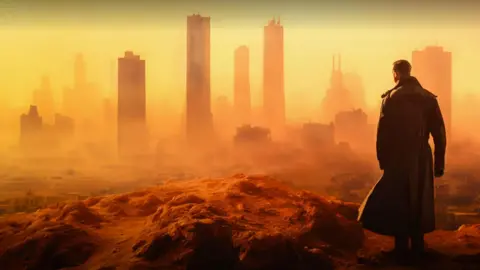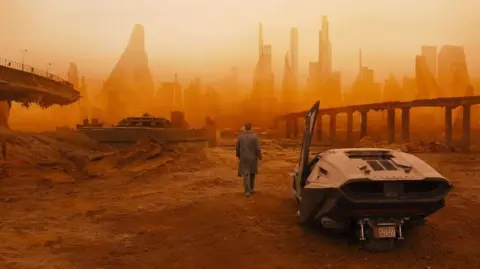Blade Runner 2049 maker sues Musk over robotaxi images
 Tesla / YouTube
Tesla / YouTubeThe maker of the film Blade Runner 2049 has sued Tesla, Elon Musk and Warner Bros Discovery, alleging they used imagery from the movie without permission.
Production firm Alcon Entertainment claims it had specifically denied a request from Warner Bros to use material from the film at the launch event for Tesla's long-awaited robotaxi.
Alcon alleges that despite its refusal Tesla and the other organisers of the event on 10 October used artificial intelligence (AI) to create promotional imagery based on the film.
Tesla and Warner Bros did not immediately reply to requests for comment from BBC News.
The “financial magnitude of the misappropriation here was substantial," the lawsuit said.
"Any prudent brand considering any Tesla partnership has to take Musk’s massively amplified, highly politicised, capricious and arbitrary behaviour, which sometimes veers into hate speech, into account," it added.
Alcon also accused the event organisers of "false endorsement" by suggesting a connection between the production company and Tesla.
Warner Bros, which hosted the robotaxi launch event at one of its movie studios, was also the distributor of Blade Runner 2049 when it was released in 2017.
The highly-anticipated sequel to the 1982 cyberpunk classic Blade Runner, starred Ryan Gosling, Harrison Ford, Ana de Armas and Jared Leto, and won two Academy Awards.
 Warner Bros
Warner BrosElon Musk has referred to the original film several times in the past, hinting at one point that it was a source of inspiration for Tesla's Cybertruck.
Alcon is currently producing a spinoff television series Blade Runner 2099.
Separately, the director of 2004 sci-fi film I, Robot accused Mr Musk of copying his designs for humanoid machines and self-driving vehicles.
The title of Tesla robotaxi event - We, Robot - which played on the the title of an Isaac Asimov short story collection, caught the eye of Alex Proyas.
"Hey Elon, can I have my designs back please," Mr Proyas said in a post on X which has been viewed more than eight million times.
But the claim was met with scepticism online, with some suggesting his own film is derivative.
